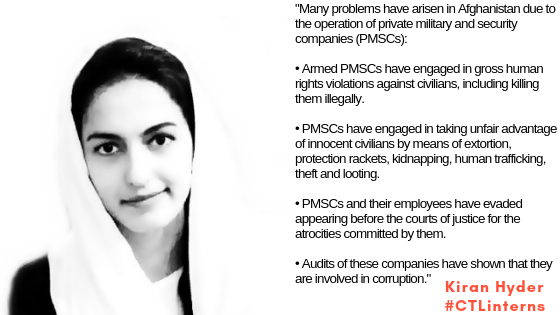Legal Status of Private Military and Security Companies in Afghanistan
An international complication which has been recognized in the new manifestations and modalities related to emerging trends in mercenary activities is the status of international private security guards in war zones. Former military and police officers from all parts of the world get conscripted and made responsible for providing “passive or static security” in areas such as Afghanistan, Iraq and other regions post-conflict, in the form of private military and security companies (PMSCs).
PMSCs are believed to fill the void created in three types of unstable circumstances:
- In areas with pre-conflict situations where armies are not completely deployed, or in post-conflict circumstances with an increasing level of uncertainty;
- In armed conflicts where organizations at the international level do not interfere; and
- In troublesome areas in countries which are developing, and where there is no administration of the state, and where extractive international companies operate.
The acts of PMSCs usually obscure:
(a) The difference between private and public entities and their operations;
(b) The status of a person as to whether he or she is a civilian or combatant during armed conflicts;
(c) Whether the acts carried out are of a military nature or for security purposes;
(d) The kind of organization of which the person is an employee and whether it is a nonprofit humanitarian organization or a for-profit security organization with a “humanitarian hat”; and
(e) The difference between active and passive security.
International PMSCs started working in Afghanistan after 9/11 alongside the US and other International Security Assistance Forces (ISAF), and their numbers increased over time, especially in 2007. This situation worried the then President, Hamid Karzai, who ordered for their abolition in 2010. They were to be replaced by the Afghan Public Protection Force (APPF) which was state-owned, but the APPF was closed down in 2014 because it failed to meet the demands and criteria of international clients. Now PMSCs either work after acquiring ‘exception’ licences or merely provide non-armed support and training services.
Many problems have arisen in Afghanistan due to the operation of private military and security companies (PMSCs):
- Armed PMSCs have engaged in gross human rights violations against civilians, including killing them illegally.
- PMSCs have engaged in taking unfair advantage of innocent civilians by means of extortion, protection rackets, kidnapping, human trafficking, theft and looting.
- PMSCs and their employees have evaded appearing before the courts of justice for the atrocities committed by them.
- Audits of these companies have shown that they are involved in corruption.
The reason behind the emergence of such problems is insufficient transparency, since clients of such companies either do not hold these companies accountable for their actions or do not control their actions at all. This has resulted in impunity in the country because clients have ignored to opt for companies with professional standards and have instead opted for companies which are more feasible to their requirements and with which they may have personal connections. Moreover, when international clients employ local security companies, they fail to take into account the history of such companies as to whether or not they have been involved in local politics. This often results in clans, warlords and militias gaining more income and influence. It has also contributed to a lack of sanctions against PMSCs which continue to fail to comply with international humanitarian law. Watan Risk Management has been reported to be one such company, the owners of which happen to be relatives of the former President Karzai. Another company, NCL Holdings, has been reported to be chaired by the son of the former Defense Minister, Rahim Wardak.
With respect to the functions of PMSCs, there is not only a vacuum in international law but a grey area as well which can be exploited by these companies to blur the details. The actions of the PMSCs constitute a comparatively new phenomenon. These new modalities have not been discussed yet in international legal instruments dealing with such matters. It is, therefore, vital that governments deliberate on the question of responsibility of states having monopolistic powers over the actions of such companies.
In this regard, a UN Working Group envisioned the convoking of five regional governmental consultations, within a span of two years, with an aim to reach a common settlement as to which supplementary conventions may be needed. The first regional governmental consultation was convened in Panama on 17 and 18 December, 2007. Further conferences in the future will be expected to:
- Provide a serious understanding of accountability of all stakeholders including private military and security companies;
- Discuss existing loopholes in regulating the activities of international companies providing military and security services; and
- Frame apt legal standards, guiding principles or surplus international instruments such as declarations or additional protocols.
———-
References
-
www.tkg.af/english/reports/political/234-top-leaders-tied-to-security-companies. Last accessed July 14, 2018
-
UN (2010): Report of the Working Group on the Use of Mercenaries as a Means of Violating Human Rights and Impeding the Exercise of the Right of Peoples to Self-Determination: Addendum Mission to Afghanistan: 14 June, A/HRC/15/25/ Add.2, p. 24.
-
Ibid., p. 22; Schmeidl, Susanne (2008): Case Study Afghanistan, in: Joras, Ulrike, and Schuster, Adrian (eds.): Private Security Companies and Local Populations, Bern: SwissPeace, pp. 27, 29; Rønnevik, John S. (2012): Who Runs This Town? Private Security Companies and Their Effect on Security Sector Reform in Afghanistan. Master Thesis, University of Bergen, p. 54; House of Representatives (2010): Warlord, Inc.: Extortion and Corruption Along the U.S. Supply Chain in Afghanistan: Report by the Majority Staff, Washington, D.C: Committee on Oversight and Government Reform, p. 3.
-
Commission on Wartime Contracting (2011), pp. 75–80.
-
www.tkg.af/english/reports/political/234-top-leaders-tied-to-security-companies
The views expressed in this article are those of the author and do not necessarily represent the views of CourtingTheLaw.com or any other organization with which she might be associated.


